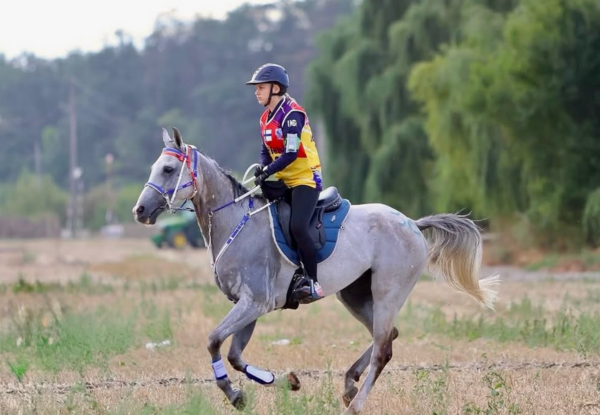First endurance ride? Discover the essential equipment checklist for Green Beans. What you really need, what to...
Hippotherapy: extraordinary benefits of therapy with horses
Hippotherapy is much more than a simple equestrian activity.
It is a powerful form of therapy that, through interaction with the horse, brings physical, cognitive, emotional, and social benefits to people with disabilities or affected by different conditions.
In this article, we will explore how it works, what the benefits are, and why more and more specialists see it as a valuable rehabilitation tool for adults and children.
WHAT IS HIPPOTHERAPY AND HOW DOES IT WORK?
Hippotherapy is a therapy assisted by horses that is part of equestrian rehabilitation.
It is based on the movement of the horse, which creates neuromotor, sensory, and emotional stimulation in the patient.
This activity is always supervised by a qualified therapist and is aimed at people with motor, cognitive, and behavioral difficulties.
During hippotherapy sessions, the horse walks at a regular pace, sending rhythmic impulses similar to human walking, which stimulate the nervous system, improve coordination and promote rehabilitation.
WHAT ARE THE BENEFITS OF HIPPOTHERAPY?
The benefits of hippotherapy are many and involve different areas:
-
Physical: improves muscle tone, balance, and posture.
-
Cognitive: supports attention, concentration, and cognitive development.
-
Emotional and social: boosts self-esteem, communication skills, and emotional management.
This type of therapy helps to improve the quality of life for people with disabilities or complex conditions.
FOR WHICH CONDITIONS IS HIPPOTHERAPY RECOMMENDED?
Hippotherapy is used in many clinical cases. Some of the most common conditions and disabilities treated are:
-
Autism spectrum disorders
-
Down syndrome
-
Cerebral palsy
-
Behavioral disorders
-
Attention deficit disorder
-
Speech disorders
-
Multiple sclerosis
It covers a wide range of conditions that benefit from the combination of horse movement, sensory stimulation, and connection with the animal.
WHAT IS THE ROLE OF THE HORSE AS A THERAPEUTIC TOOL?
The horse as a therapeutic tool works thanks to its ability to send natural motor impulses.
The interaction with the horse is very important: the animal responds sensitively to human behaviors, helping to create a relationship of trust, which is the base for effective therapy.
WHAT IS THE DIFFERENCE BETWEEN HIPPOTHERAPY AND PET THERAPY?
Although both are part of pet therapy, hippotherapy is a structured and rehabilitative therapy, supervised by qualified healthcare professionals, and focused on the motor response to the movement of the horse.
Traditional pet therapy, instead, is based on emotional interaction with an animal, like dogs or cats, and is often used in schools or care centers for emotional or social purposes.
HOW DOES THE RELATIONSHIP BETWEEN HUMAN AND HORSE DEVELOP?
The relationship between human and horse is based on non-verbal communication, mutual respect, and a trust bond that grows over time.
This special bond created during the sessions is therapeutic itself, because it stimulates:
-
Social skills
-
Empathy
-
Autonomy
The horse becomes a care partner, able to accept without judging, helping the patient to develop relational skills.
THE PHYSICAL BENEFITS OF EQUESTRIAN REHABILITATION
The physical benefits of hippotherapy are clear in patients with motor difficulties:
-
It improves balance and posture
-
It strengthens deep muscles
-
It helps coordination of movements
Equestrian rehabilitation uses the horse as a therapeutic extension of the therapist, working on both body and mind.
THE COGNITIVE AND EMOTIONAL BENEFITS OF HORSE-ASSISTED THERAPY
Hippotherapy also helps with psychological and emotional aspects. It helps develop:
-
Self-esteem
-
Motivation
-
Emotional management
Also, the natural environment of the therapy, the contact with the horse, and the activities during the sessions stimulate the cognitive part, promoting learning and cognitive stimulation.
HOW DOES A HIPPOTHERAPY SESSION WORK?
The sessions take place in specialized centers with selected horses and qualified instructors. Each session includes:
-
Welcoming and grooming the horse to create a bond
-
Activities on horseback (specific exercises, games)
-
Evaluation of goal achievement
Each session is personalized, aiming to improve the quality of life and help reach concrete rehabilitation goals.
WHERE DOES IT TAKE PLACE AND WHO CAN DO IT?
Hippotherapy can be done by children, teenagers, and adults with motor, cognitive, or social disabilities.
The therapy paths are supervised by trained professionals, often coordinated by a doctor.
IN SUMMARY: KEY POINTS TO REMEMBER
-
Hippotherapy is a rehabilitation therapy based on the movement of the horse and emotional interaction.
-
It offers many benefits: physical, cognitive, emotional, and social.
-
It is recommended for people with disabilities, paralysis, autism, Down syndrome, and behavioral disorders.
-
It is based on a strong relationship between human and horse, built on mutual trust.
-
It helps develop skills, neuromotor stimulation, and self-esteem.
-
It is practiced in specialized centers with certified instructors and selected horses.
If you want to know more about the benefits of horse riding, consider therapeutic riding as a complete path that joins the power of movement with the magic of the relationship between patient and animal.
A therapy that heals not only the body, but also the heart.
Need some advice? Contact us on WhatsApp +39 349 733 9837. Our team is available to guide you and help you choose the best option for your needs.
.png)
.png)
.png)













